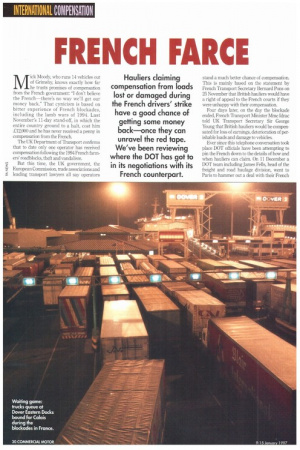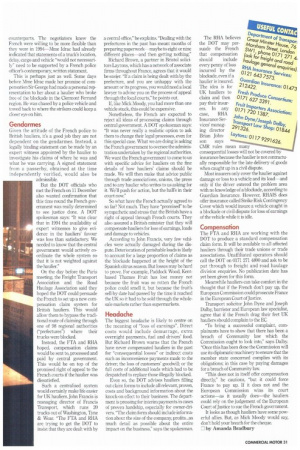INTERNATIONAL COMPENSATION
Page 32

Page 33

If you've noticed an error in this article please click here to report it so we can fix it.
Hauliers claiming compensation from loads lost or damaged during the French drivers' strike have a good chance of getting some money back—once they can unravel the red tape. We've been reviewing where the DOT has got to in its negotiations with its French counterpart.
Mick Moody, who runs 14 vehicles out of Grimsby, knows exactly how far he trusts promises of compensation from the French government: "I don't believe the French—there's no way we'll get our money back." That cynicism is based on bitter experience of French blockades, including the lamb wars of 1994. Last November's 11-day stand-off, in which the entire country ground to a halt, cost him £12,000 and he has never received a penny in compensation from the French.
The UK Department of Transport confirms that to date only one operator has received compensation following the 1994 French farmers roadblocks, theft and vandalism.
But this time, the UK government, the European Commission, trade associations and g_c leading transport lawyers all say operators
stand a much better chance of compensation. This is mainly based on the statement by French Transport Secretary Bernard Pons on 25 November that British hauliers would have a right of appeal to the French courts if they were unhappy with their compensation.
Four days later, on the day the blockade ended, French Transport Minister Mme Idrac told UK Transport Secretary Sir George Young that British hauliers would be compensated for loss of earnings, deterioration of perishable loads and damage to vehicles.
Ever since this telephone conversation took place DOT officials have been attempting to pin the French down to the details of how and when hauliers can claim. On 11 December a DOT team including James Fells, head of the freight and road haulage division, went to Paris to hammer out a deal with their French counterparts. The negotiators knew the French were willing to be more flexible than they were in 1994 Mme Idrac had already indicated that statements of a truck's location, delay, cargo and vehicle "would not necessarily" need to be supported by a French police officer's contemporary written statement.
This is perhaps just as well. Some days before Mme Idrac made her promise of compensation Sir George had made a personal representation to her about a haulier who broke free of the blockade in the Clermont Ferrand region. He was chased by a police vehicle and towed back to where the strikers could keep a closer eye on him.
Gendarmes
Given The attitude of the French police to British hauliers, it's a good job they are not dependent on the gendarmes. Instead, a legally binding statement can be made by an expert witness appointed by the haulier to investigate his claims of where he was and what he was carrying. A signed statement from a passerby, obtained at the time independently verified, would also be admissible.
But the DOT officials who met the French on 11 December also wanted confirmation that this time round the French government was really determined to see justice done. A DOT spokesman says: "It was clear that in 1994 the availability of expert witnesses to give evidence in the hauliers' favour was less than satisfactory. We needed to know that the central government would actively coordinate the whole system so that it is not weighted against the haulier."
On the day before the Paris meeting, the Freight Transport Association and the Road Haulage Association said they hoped the DOT could persuade the French to set up a new compensation claim system for British hauliers. This would allow them to bypass the traditional route of claiming through one of 98 regional authorities ("prefectures") where their trucks were blocked.
Instead, the FTA and RHA hoped, compensation claims would be sent to, processed and paid by central government. This would be on top of the promised right of appeal to the French courts if the haulier was dissatisfied.
Such a centralised system would certainly make life easier for UK hauliers. John Francis is managing director of Francis Transport, which runs 20 trucks out of Washington, Tyne & Wear. "The FrA and RHA are trying to get the DOT to insist that they are dealt with by a central office," he explains. "Dealing with the prefectures in the past has meant months of preparing paperwork maybe to eight or nine different places—and then getting nothing."
Richard Brown, a partner in Bristol solicitors Laytons, which has a network of associate firms throughout France, agrees that it would be easier. "lf a claim is being dealt with by the prefecture, and you are unhappy with the amount or its progress, you would need a local lawyer to advise you on the process of appeal through the local courts," he points out.
If, like Mick Moody, you had more than one vehicle stuck, this could be expensive.
Nonetheless, the French are expected to reject all ideas of processing claims through central government. A DOT spokesman says: "It was never really a realistic option to ask them to change their legal processes, even for this special case. What we are doing is asking the French government to oversee the administration undertaken by the regional authorities. We want the French government to come to us with specific advice for hauliers on the fine details of how hauliers' claims should be made. We will then make that advice public through trade associations, unions, the press and to any haulier who writes to us asking for it. We'll push for action, but the ball's in their court now."
So what have the French actually agreed to so far? Not much. They have "promised" to be sympathetic and stress that the British have a right of appeal through French courts. They also assured a British minister that they will compensate hauliers for loss of earnings, loads and damage to vehicles.
According to John Francis, very few vehicles were actually damaged during the dispute. Deterioration of perishable loads is likely to account for a large proportion of claims as the blockade happened at the height of the Spanish citrus season. But losses may be hard to prove. For example, Paddock Wood, Kentbased Thames Fruit has lost money not because the fruit was so rotten the French police could smell it, but because the fruit's sell-by date had passed by the time it reached the UK so it had to be sold through the wholesale markets rather than supermarkets.
Headache
The biggest headache is likely to centre on the meaning of "loss of earnings". Direct costs would include demurrage, extra overnight payments, fuel and drivers' food. But Richard Brown warns that the French have never compensated hauliers in the past for "consequential losses" or indirect costs such as inconvenience payments made to the driver; the loss of customers' goodwill; or the full costs of additional loads which had to be despatched to replace those illegally blocked_ Even so, the DOT advises hauliers filling out claim forms to include all relevant, proven, costs and background information about the knock-on effect to their business. The department is pressing for interim payments in cases of proven hardship, especially for owner-drivers "The claim form should include information about the size of the company, profits, ..as much detail as possible about the entire impact on the business,' says the spokesman. the DOT may
incurred by thpeen haulier is insured. ,Guardian The idea is for L 12422. —rance: /473 UK hauliers to Fresh prod claim and then 0177 6.-} uce Consortium: pay their insurFruit ers. In any 0171 mPorfers As . case, RHA 720 1387 s°0ahon:
Insurance Ser
vices' manag2,, Port Low st" ua. ing director '"1326. Brian JohnLoYtons: 0 1 7 on^ son says ramegnak„ y1626. CMR rules mean many' consequential losses will not be covered by insurance because the haulier is not contractually responsible for the late delivery of goods when caught up in a civil dispute.
Most insurers only cover the haulier against damage or loss to a vehicle and its load—and only if the driver entered the problem area with no knowledge of a blockade, according to Guardian Insurance. However, RHAIS does offer insurance called Strike Risk Contingency Cover which would insure a vehicle caught in a blockade or civil dispute for loss of earnings of the vehicle while it is idle.
Compensation
The FTA and RHA are working with the DOT to produce a standard compensation claim form. It will be available to all affected hauliers through their trade unions or trade associations. Unaffiliated operators should call the DOT on 0171 271 4800 and ask to be put through to freight and road haulage division enquiries. No publication date has yet been given for this form.
Meanwhile hauliers can take comfort in the thought that if the French don't pay up, the European Commission could prosecute France in the European Court of Justice.
Transport solicitor John Dyne and Joseph Dalby, barrister and European law specialist, agree that if the French drag their feet UK hauliers should complain to the EC.
"To bring a successful complaint, complainants have to show that there has been a breach of Community law which the Commission ought to look into," says Dalby. ''Once this has been done the Commission will use its diplomatic machinery to ensure that the member state concerned complies with its obligations; in this case by paying damages for a breach of Community law.
"This does not in itself offer compensation directly," he cautions, "but it could force France to pay up. If it does not and the European Commission wins its court actions—as it usually does—the hauliers could rely on the judgement of the European Court of Justice to sue the French government.
It looks as though hauliers have some powerful allies. But, as Mick Moody would say, don't hold your breath for the cheque.
El by Amanda Bradbury
































































































